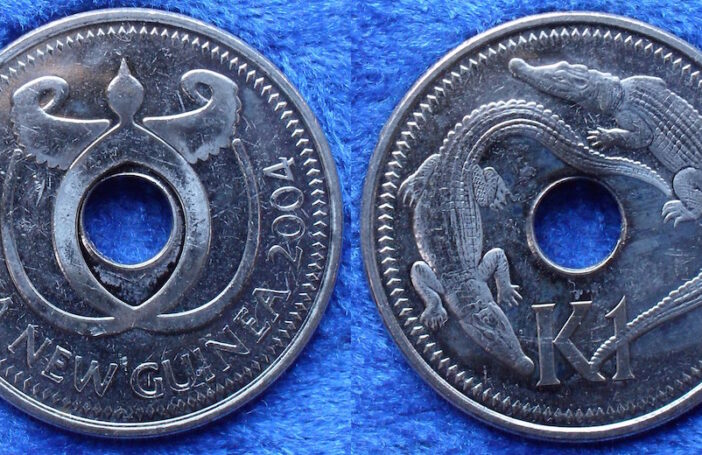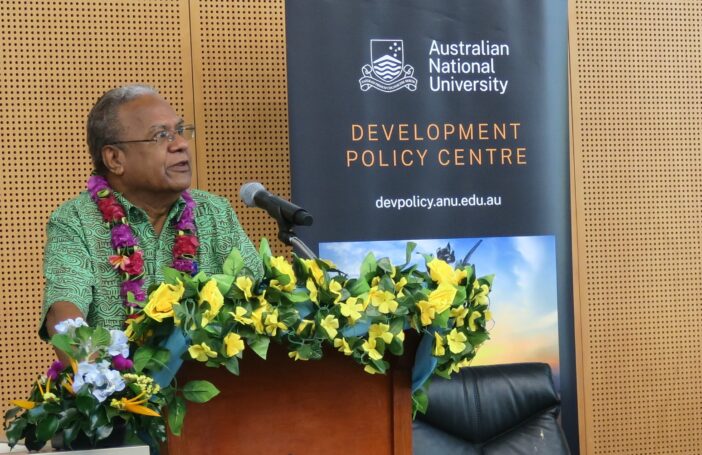On 30 September, PNG’s central bank (BPNG) released their six monthly monetary policy statement. This was a mixture of good and bad news. I mentioned in a blog a couple of weeks ago that possibly the only thing more boring in economics than exchange rates was monetary aggregates. So this blog will go into these monetary aggregates but once again, there are some very important development issues tucked away among the technical details. Indeed, there are some very worrying steps being taken that auger poorly for PNG’s international credibility and ultimately its future development.
Good news
On the good news side. First, it is positive that the statement came out and continued a positive pattern of transparency of major six-monthly updates (on top of shorter monthly updates). Some countries don’t do this – and this can damage their credibility.
Second, the updates on some of the behind-the-scenes work that make for a more efficient economy are impressive. Improving payments systems lowers costs for people and businesses. They can assist in streamlining arrangements such as remittance payments to villages. And off the backbone of these improved systems there is scope to make more payments electronically – a development particularly important in PNG where geography and the security situation means that carrying and moving cash can be both dangerous and expensive.
Third, there are important messages included in the statement signalling areas of concern. This is an important role for an independent central bank. BPNG is concerned about unbudgeted expenditures and calls for a constraint on spending given the revenue shortfalls in the first six months of 2014. The lack of progress on the Sovereign Wealth Fund is another area of concern.
Fourth, the balance of payments is expected to record a deficit of only K196 million in 2014, down considerably from the estimated deficit of K1,143 million only six months ago – although the picture is less rosy for 2015 before improving in 2016.
Bad news
Now for some explicit bad news. First, inflation is expected to be around 8 per cent, a considerable jump from the 6 per cent forecast by the PNG Treasury only two months earlier. Inflation is known to especially hurt the poor. For a developing country such as PNG, this is a worrying trend but not too unusual a rate. The depreciation of the exchange rate over the last year is clearly a factor in this.
Second, foreign exchange reserves are expected to keep dropping considerably through to the end of 2015 at least. This is a little difficult to untangle as some of the text and the appendix tables are not consistent, but gross international reserves are expected to drop from K8.42 billion in 2012 to K6.49 billion in 2014 and then down to K4.95 billion in 2015 before recovering in 2016. The major issue is that PNG LNG receipts are not expected to flow through strongly in 2015, yet major repayments are expected on the commercial loan that paid for Oil Search shares.
Third, private sector credit growth is now expected to be less than inflation. As PNG moves from the LNG investment phase, it was hoped that the private businesses in other areas of the economy would help fill the gap. This is now not expected to happen.
Slippery slope?
There is even more worrying implicit bad news. First, the statement presents as a positive a new agreement that the central bank will purchase from the Treasury any government bills or inscribed stocks that aren’t picked up by the private market. BPNG will then make these bills available to small investors to purchase (through their TAP facility). In theory, this sounds great. In reality, it is disastrous. There is now an imperceptibly fine line between what the bank is doing and the bank simply printing money to fund the growing budget deficit. Small investors are not buying the new central bank bills (in the last week of September, less than K1 million were purchased). So the central bank is now providing almost unlimited financing for any deficit. Once started, this near printing of money can be a very addictive habit for any government.
This agreement by the central bank to purchase bills and stocks that the private sector doesn’t want, despite very significant increases in interest rates, is an extremely worrying step down what can be a very slippery slope. Of course a central bank can have a role in dealing with a short-term liquidity problem for a government – but this was already in place in PNG through the equivalent of a small over-draft facility.
Some may argue that this process, also known as a form of “quantitative easing” or “unconventional monetary policy” is being used in the US and Japan and possibly Europe to try and stimulate the economy after the Global Financial Crisis. However, the circumstances are very different. In the US and Europe and Japan, there are few inflationary concerns – indeed, the worry has been about deflation. In PNG, as noted above, the worry is the significant upward trend in inflation to 8 per cent. Economic history is filled with examples of how printing money can quickly over-heat an economy.
The US, Japan and Europe also have some safeguards that can help minimise the damage to macro-economic stability from this quantitative easing. A key one is a freely floating currency. This no longer appears to be the case in PNG (more on this below). Another partial safeguard is to have a strong wages policy that minimises the risk that inflation is built into constant rounds of wage increases. Recent public sector and minimum wage outcomes suggest that this is not the case in PNG either. Knowing that the measure was only a temporary one would provide some reassurance. However, no exit strategy is mapped out.
A second area of implicit concern is the discussion about the exchange rate. This is a sensitive issue for businesses in PNG. As noted in an earlier blog, the move to lift the effective exchange rate has losers (exporters, especially the rural poor) and winners (importers, including consumers). However, the inevitable rationing of foreign exchange is a significant and growing concern for all PNG businesses. Slowing the pattern of depreciation can assist with inflation by lowering the cost of imported products. The central bank was clearly very concerned about these inflationary pressures – as it should be. However, the explanation for why the change was made through lifting the exchange rate still is not convincing. The bank claims that the gap between the “interbank” rate and the buy and sell rates was a clear sign of a market failure. This might have been the case if the “interbank rate” was actually set by the market. But no market exchange rate sits at exactly 0.413 USD/PGK for over six months (from 31 October 2013 to 15 June 2014) before a very controlled move downwards of one cent in the last 4 months – at this rate, it will get back to the 3 June 2014 exchange rate in over two years’ time. There is nothing to explain why the interbank rate effectively became frozen at the end of last year. However, it clearly no longer reflects the balance between supply and demand. This is shown by what was actually occurring in the market. It is shown by the cost of having to use foreign reserves to slow down the depreciation. It is shown by the need to start rationing foreign exchange between importers. The concern in PNG is not with action to narrow the trading band. The concern is the lifting of the exchange rate to something currently around 12.5 per cent above previous market levels. One suggestion that would help restore confidence is if the central bank tendered its interventions into the market. This would help set a new interbank market reference rate, around which bands could be set.
A recent publication by PNG’s Tax Reform Committee (page 14) sets out cogently some of the key macro-economic policy changes in the 2000s that have helped PNG manage its current resource boom and avoid having to go to the IMF for a bailout (which it had to do three times in the 1990s). These changes relate to good fiscal (sustainable debt levels), monetary (an independent central bank) and exchange rate (largely reflecting market forces) policies.
The moves towards effectively printing money to finance the deficit and moving away from a market determined exchange rate are very disturbing. They put the central bank, and ultimately PNG itself, on a tempting but potentially disastrous slippery slope. A smaller deficit in 2015 will help reduce the need for deficit financing, and put less downward pressure on the exchange rate. But the central bank itself should revert to a floating exchange rate, and stop financing the government deficit. Otherwise, PNG will be increasingly exposed to risks of high inflation and exchange rate rationing, its macroeconomic credentials will be damaged, and the benefits of its long period of un-interrupted growth potentially thrown away.
Paul Flanagan is a Visiting Fellow at the Development Policy Centre. He has a long standing interest in public policy issues in Australia, PNG and more broadly. He has recently left the Australian Treasury as Chief Advisor, Foreign Investment and Trade Policy Division. Earlier in his career, he spent 17 years in AusAID in a range of policy, budget, sectoral and country program roles.






interesting to note that BPNG holdings of Tbills has gone from PGK200m in Jun-14 to a whopping PGK1.5bn by end Dec-14. I wonder what it would be by now?
Paul, your article correctly highlights the dangers to PNG’s long term economic growth by the
a) reckless spending of the PNG government (running budget deficits) and
b) BPNG resorting to unconventional monetary policy
You are merely highlighting what the authorities already know. However, you might not be aware that given the kind of country PNG is Politically and Economically (its two principle underlying problems) most of PNGs macro-structural development agendas will never be realised.
First, The electoral system of electing genuine legislators (leaders as they are referred to in PNG) in a functioning democracy is probably another 20 years away for PNG. When Democracy at its very core is broken and dysfunctional, it is not a democracy.
Second, The unfavorable economic fundamentals underpinning the PNG economy. There has always been a net flow of wealth out of PNG (since the formation of the country). In order for a country to gain economic independence, wealth/capital must be reinvestment and recycled to build domestic capacity. When you have foreign dominance of the PNG economy and its wealth, the incentive is not there to reinvest (but rather repatriate offshore).
Paul, it will do PNG a lot of good if we have more commentators who took a real serious look at these two broken systems, that are the pillars of any economically successful democracy.
May I also add, that the economic principle/theory that you and many other economists, policy developers, and commentators prescribe for PNG has sadly been in use and is not working.
Conventional or Unconventional monetary tools (call it whatever you will), does not work work (never has and never will) in a PNG type economy that operates outside the normal realms of national economic fundamentals.
Thanks Paul. Good analysis. The problem the country will face about having the inflation rate higher than the growth rate in private sector investment must be critically considered by BPNG.